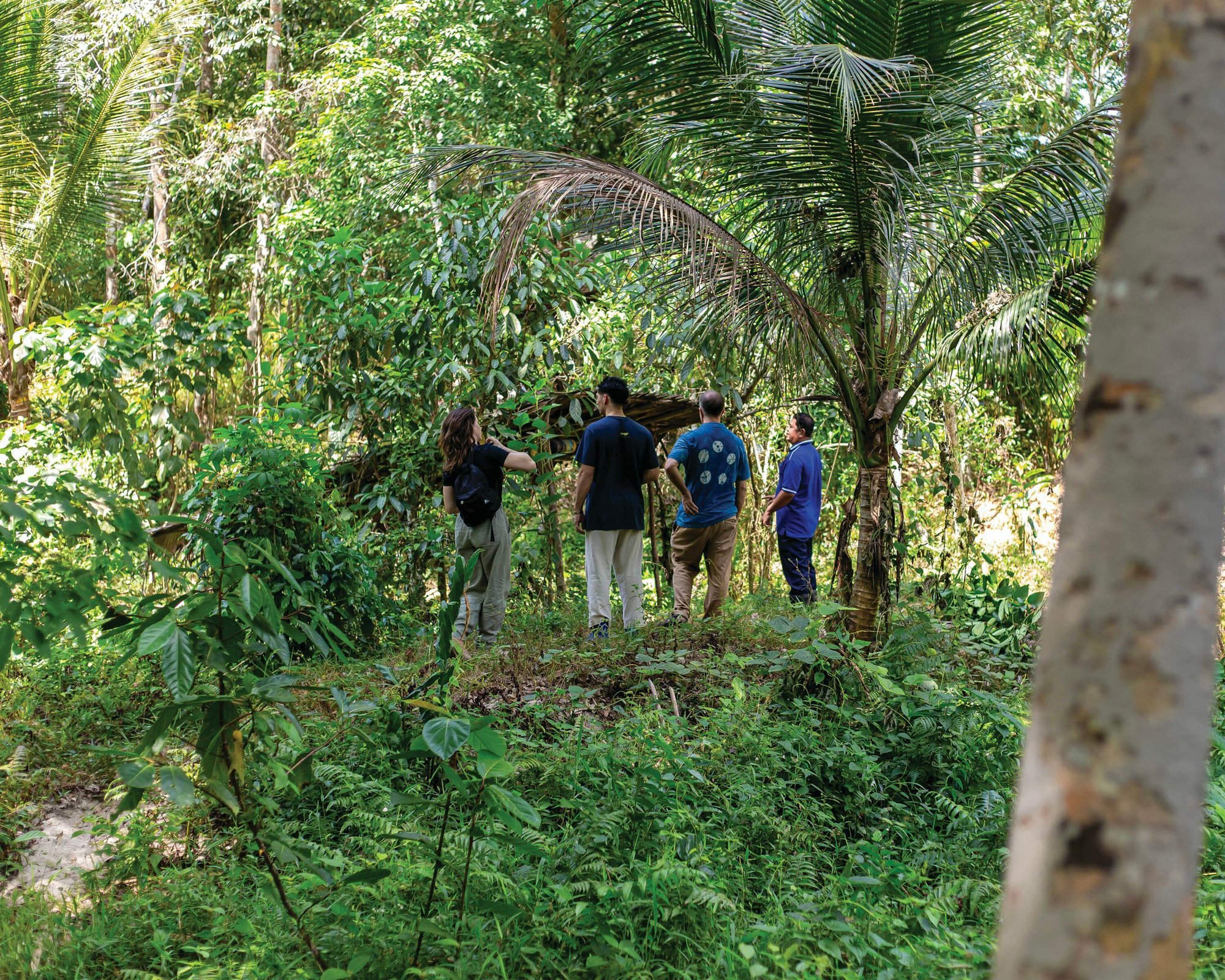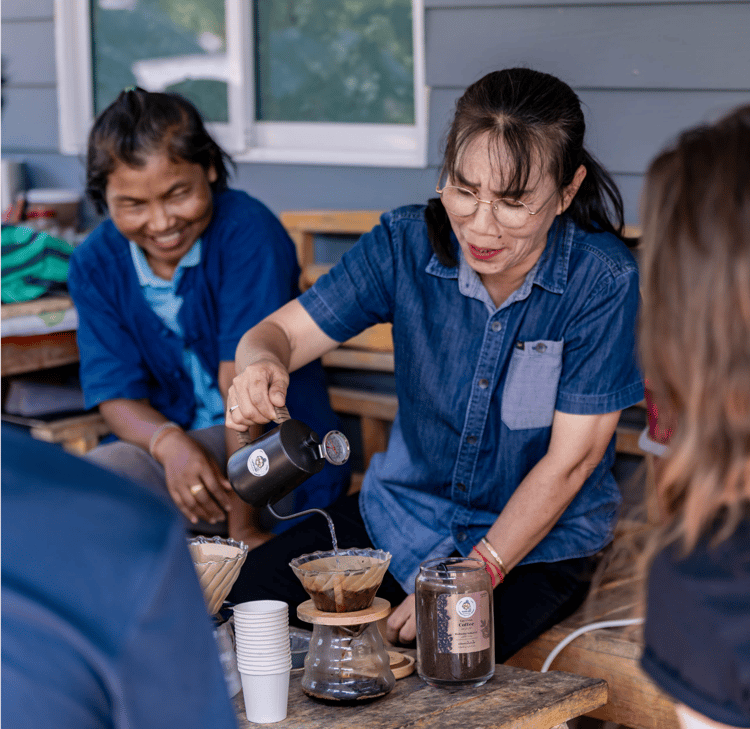Scaling a regenerative supply chain
In collaboration with Terra Genesis, NFW is building a new market for regenerative latex, supporting the growth of the regenerative agroforestry movement among smallholders in South Thailand.
Meet Natha Chaiphet (Ja).
Ja is a rubber gardener and a member of the Thepha farmer cooperative in South Thailand’s Songkhla watershed.
She is also a key leader of the Wanakaset (pronounced wanna-ka-sate) movement, a grassroots agroforestry initiative focused on transforming rubber monoculture farms into Wanakaset forest gardens. These forest gardens are diverse, polyculture agroforestry systems filled with hundreds, or even thousands, of species in addition to rubber trees.
With the support of Terra Genesis, a regenerative design firm, NFW is working with the Thepha cooperative to establish the first fresh latex supply chain for regenerative Wanakaset latex, creating a market that recognizes and compensates these smallholders for their ecosystem services.
This new market is designed to help the Thepha cooperative expand the Wanakaset movement in their region. It will demonstrate to neighboring farmers (who are poised to transition) the viability of this market, and it will offer a tangible incentive to transition their rubber farms from monoculture to Wanakaset polyculture.
Ja says that many in her community are keenly watching the development of this Wanakaset latex supply chain. “This is a path that’s not only for people who are passionate about the forest,” she says, “But it’s an economic answer and a path forward in the future of rubber.”
NFW biomaterials offer plant-based alternatives to fossil-fuel-derived plastics (such as polyurethane, polyester, and synthetic styrene butadiene “rubber”). Where an oil rig or a fracking operation will always be extractive and harmful, farming can be regenerative for both the land and the farming community. Because NFW sources plants, we have both the opportunity and the responsibility to support regenerative agriculture in our upstream supply chain.
Earlier this year, NFW team members Griffin Christensen and Mary Allen visited Ja and the Thepha farmers alongside Michael Commons, regional coordinator for Terra Genesis, to tour several Wanakaset forest gardens and discuss the next phase of the regenerative latex supply chain project.
%201.png?width=1200&height=1797&name=Thepha05022024%20(460)%201.png)

%20shows%20fire%20torch%20ginger%2c%20one%20of%20many%20secondary%20crops%20found%20in%20Wanakaset%20forest%20gardens..jpeg?width=1500&height=2000&name=Natha%20Chaiphet%20(Ja)%20shows%20fire%20torch%20ginger%2c%20one%20of%20many%20secondary%20crops%20found%20in%20Wanakaset%20forest%20gardens..jpeg)
%201.png?width=1200&height=1797&name=Thepha05022024%20(408)%201.png)
From monoculture to Wanakaset agroforestry.
Most rubber farms in Thailand are monocultures, a legacy of the Green Revolution in the 1960s. In these systems, farmers prioritize uniformity and predictability by planting rubber trees of the same age and genetics, applying herbicides, and eliminating competition from other plants. However, these monocultures lack the natural synergies that occur in diverse ecosystems, requiring synthetic fertilizers and lots of human labor to maintain productivity. A growing body of science is uncovering the ways that trees exchange nutrients, prepare the ground for one another, regulate pests, and create biological niches necessary for their neighbors to grow and thrive.
Ja’s farm was once a typical rubber monoculture, too. Eighteen years ago, it was just rows of rubber trees and grass. But Ja noticed that her trees were growing more slowly, were more vulnerable to floods and droughts, and even sounded different compared to the surrounding forest. She noticed the surrounding forest ecosystems producing abundant life without human labor, synthetic chemical fertilizers, or weeding. She concluded that her monoculture system was compromising her and her trees' health.
In response, Ja decided to let the forest take over. She allowed the natural ecosystem to regrow around her rubber trees and began planting food crops in between. Over time, her farm transformed into a thriving forest garden with an abundance of plants, fungi, and animals.
“It’s less work and less investment if you let the wild growth be,” Ja explains.
.jpg?width=2000&name=19-20%20March%202024%20Thepha%20Songkhla%20Picture%20(456).jpg)

%20(1).jpg?width=2000&name=19-20%20March%202024%20Thepha%20Songkhla%20Picture%20(501)%20(1).jpg)
The agroforestry movement takes root.
At first, few people in Ja’s community understood what Ja was doing. But today, more than 60 farmers in the region have followed suit, and many others are poised to transition.
The benefits of Wanakaset forest garden systems are hard to overstate: they improve the health and productivity of rubber trees, foster biodiversity, and create economic stability by enabling farmers to grow additional crops like cacao, pineapple, black pepper, and coffee.
Wanakaset is more than just rubber farming; it’s a form of managed reforestation that boosts biodiversity, soil health, and carbon sequestration.
Wanakaset also restores food sovereignty to communities. Unlike monoculture farmers, who must purchase their food, Wanakaset farmers grow a variety of plants that serve as food, medicine, or timber. For Ja, preserving this knowledge of forest ecosystems and the uses of diverse plants is a vital part of the movement. Without it, much of this traditional wisdom would be lost.
Michael, our Terra Genesis collaborator and translator, agrees. “This is really a key part of the Wanakaset movement. It’s not only the biodiversity aspect but it’s this knowledge,” he adds. “In this area, there could be a thousand species, if you understand a thousand species, their food, their medicinal uses, you have a lot of strength.”
Here Yai Chim prepares us coffee with lime and honey, all harvested from her forest garden. She sells her coffee beans to local coffee shop. Similarly, Ja now sells secondary food crops to a local restaurant.

Less labor, more life.
Wanakaset farming requires less labor and fewer inputs than monoculture systems. Farmers can reduce or eliminate synthetic chemicals and no longer need to hire labor to clear weeds between their trees.
“Wanakaset is less cost. I was paying someone twice a year to mow all my weeds,” Nui, another Wanakaset farmer, tells us. “I don’t pay that. I haven’t used any fertilizer for three years. I’m still getting good production with my latex.”
Wanakaset farming is about exerting less control -- not more -- and working in harmony with the forest’s ecology rather than keeping the native forest at bay. And an added benefit: “It’s just much cooler, particularly when it’s hot,” says Nui. The increase in plant life (whose leaves convert solar energy into biomass) keeps Wanakaset farms cooler, allowing farmers to tap rubber trees during the early morning hours instead of in the middle of the night. This makes rubber farming safer and more accessible, especially for women.
Just a few hours from the Thepha cooperative, Loong Vitoon's forest garden, now stewarded by Prakroo Prayut, showcases the longevity and resilience of these systems.
This is one of the oldest Wanakaset systems in Thailand, and Prakroo Prayut uses it to preserve and pass on this ancestral knowledge. Monoculture rubber trees are typically tapped for about 25 years before they are deemed no longer sufficiently productive.
By contrast, these trees were planted in 1968: they are 56 years old. “The latex from these trees is 45% dry rubber content,” says Prakroo Prayut.
“It’s the basically highest dry rubber content from anyone we know,” adds Michael, “from these old and mature trees.”
Creating and scaling a regenerative Wanakaset supply chain
The Thepha cooperative currently supplies fresh latex to a large concentrator, where it’s mixed with conventional latex to produce everyday products like balloons and gloves. But through our partnership with Terra Genesis, we are helping the cooperative create a new supply chain for Wanakaset latex that will be traceable from farm to product and that will compensate Wanakaset farmers for ecosystem and community benefits of their work.
These benefits are tracked and quantified through EthosTM Regenerative Outcome Verification (Ethos ROV). Ethos ROV was developed by Terra Genesis in collaboration with smallholders to track a broad range of qualitative and quantitative metrics in the transition from monoculture to Wanakaset.
To date, we have onboarded 40 new farmers to Ethos ROV, which represents 180 hectares under Wanakaset management. Initial data indicates that each hectare of a Wanakset forest garden sequesters 6 tonnes more carbon in its soil and living biomass than a conventional monoculture.
NFW covers the operational cost of initiating and running the Ethos ROV program for the Thepha farmer cooperative, this certification does not place the monetary burden of administration on the farmers. This is crucial because it empowers smallholder farmers to participate in and to benefit from the quantitative and qualitative tracking of their ecosystem services. (Certification programs that place the cost on farmers can give a market advantage to the large plantations that can afford to invest in the program, while excluding smallholders who have fewer financial resources. The result is that smallholders often cannot access market premiums for sustainably grown products, even when they are implementing the same (or a higher) standard of environmental stewardship.)
The first phase of our work focused on reverse-engineering the supply chain, collaborating with every player to document and trace the latex from Wanakaset farmers to end-stage rubber suppliers. This process provides farmers with greater visibility into how their latex is used and offers NFW and our brand partners unparalleled insight into the journey of our raw materials. Now we are in the process of transitioning all of our rubber supply for NFW’s PLIANT™ outsoles to regenerative Wanakaset rubber from the Thepha farmers.
.jpg?height=2000&name=Thepha05022024%20(417).jpg)
.jpeg?width=768&height=1024&name=Image%20(11).jpeg)
.jpg?height=2000&name=19-20%20March%202024%20Thepha%20Songkhla%20Picture%20(458).jpg)
The upward spiral.
As more farmers transition to Wanakaset, the collective impact on the ecosystem grows. Chaweng Thammaro, who has practiced Wanakaset agroforestry for nearly a decade, is seeing a resurgence of wildlife on his land as more of his neighbors have transitioned to Wanakaset agroforestry as well. “Every week brings new discoveries,” he says, from otters to Giant Mountain Frogs.
Everything in the biosphere is profoundly connected. The Thepha farmers’ work benefits the entire Songkhla watershed and all the life that depends on this ecosystem. The world’s rainforest regions are fundamental to the stability of all life on earth. The Wanakaset farmers work – and their influence on the future of rubber farming across Thailand and Asia – benefits everyone on this planet. They are leaders in their community, and we are honored to support their efforts and help grow the movement.
